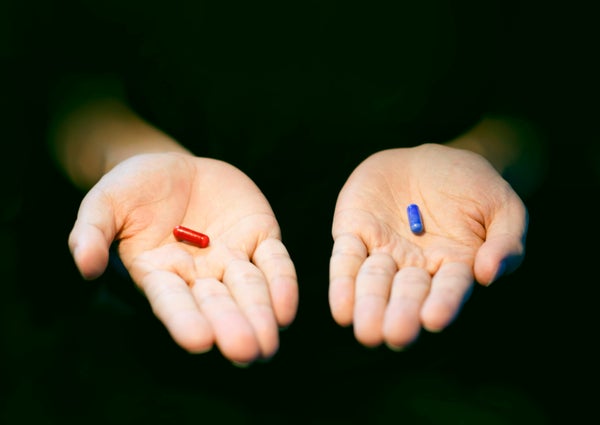This article was published in Scientific American’s former blog network and reflects the views of the author, not necessarily those of Scientific American
Note: This essay first appeared on the Hastings Bioethics Forum on March 20, 2020.
While patients can and do recover from coronavirus infections, there are currently no approved treatments that are known to work against COVID-19. President Trump believes otherwise. He said at his press briefing yesterday, that two drugs, hydroxychloroquine and remdesivir, were “essentially approved for prescribed use” to treat COVID infected patients. He referred to these “approvals” as a “tremendous breakthrough,” and applauded Food and Drug Administration Commissioner Stephen Hahn and the agency’s scientists for their quick work approving these medications. Commissioner Hahn took to the podium to clarify the president’s message, saying that these drugs are not yet, in fact, known to be safe and effective treatments for coronavirus infections.
Once again, President Trump has misled the American people on the nation’s response to the pandemic. In an ideal world, there would be several drugs in rich supply around the world that could be used immediately and safely to restore health to patients with severe, life-threatening coronavirus infections. However, until scientists interpret reliable data from rigorously designed studies, it is irresponsible and reckless for the country’s leaders to claim that there are medicines available, just waiting to be used.
On supporting science journalism
If you're enjoying this article, consider supporting our award-winning journalism by subscribing. By purchasing a subscription you are helping to ensure the future of impactful stories about the discoveries and ideas shaping our world today.
The President prattled on about one of his favorite fantasies, the importance of “right to try” legislation. For decades, the FDA has allowed physicians treating patients with severe or life-threatening illnesses, who have exhausted all approved treatment options or who cannot participate in clinical trials, to request the use of experimental drugs through a system called “compassionate use.” Generally, the most common way that patients access experimental drugs is by participating in a clinical research study, in which scientists gather data on the safety and effectiveness of that drug for a particular indication, in a specific group of patients with the same health condition. There simply aren’t enough spots in clinical trials for everyone who wants to participate. And some individuals may not meet a trial’s strict eligibility criteria, particularly if they have multiple health conditions or are dying. But, for patients who have exhausted every other possible option, the FDA has created the compassionate use pathway for those individuals to seek access to the medical products already being tested in clinical trials.
In the context of coronavirus, this means that the FDA is working to expand access to potential therapeutic options in development. Experimental drugs or drugs already approved for other conditions that may—or may not—successfully treat coronavirus infections could, theoretically, be prescribed to patients. Hydroxychloroquine, for example, is already approved to treat malaria and certain arthritic conditions, and some experts believe it might work against COVID-19. The existing literature on the drug is not, contrary to the president, promising.
Remdesivir is different. It is an experimental antiviral drug that, according to extremely limited data in animals, may have potential activity against COVID-19. Its manufacturer, Gilead, is currently conducting randomized studies in adults diagnosed with COVID-19 in several Asian countries. Remdesivir is not yet approved anywhere in the world. For patients in the U.S. to access either medication, they would have to enroll in a clinical trial conducted in the U.S. or have their physician request that the drug’s manufacturer make it available through compassionate use. Importantly, companies are not legally obligated to make their drugs-in-development available, for any reason, at any time. The FDA cannot make them. Nor can right to try legislation.
Thus far, there is no reliable data to suggest that either hydroxychloroquine or remdesivir, or any other drugs for that matter, can successfully treat COVID-19. There simply isn’t enough information available yet to safely make these medicines available for widespread use. While the FDA allows patients to access drugs in development as a last resort, this is by no means a guarantee that anyone will recover. In fact, patients could get worse because of an experimental drug. Using unapproved medications in a fact-free environment will do more harm than good, possibly making a severe illness worse or even hastening death, while not allowing anyone to learn anything about what actually works.
President Trump sorely misunderstands the drug development system. But even more egregiously, he has given the nation and desperate patients false hope about what options are widely available to treat those fighting for their lives. By suggesting that these drugs are sitting on shelves just waiting to be used, the president will increase public demand for medicines that may not be safe, effective, in abundant supply or wise to use right now.
Clinical research exists for a very good reason: the vast majority of medicines that are tested in humans are not safe or effective. And even in a pandemic, carefully conducted science must rule the day to ensure that doctors are not inadvertently harming their patients by treating them with an intervention that lacks scientific evidence to support its use. Commissioner Hahn said it best: “We need to make sure that this sea of new treatments will get the right drug, to the right patient, at the right dosage, at the right time.” The only way to achieve this goal is through research, not by spreading false hope about the right to try.
Read more about the coronavirus outbreak here.
